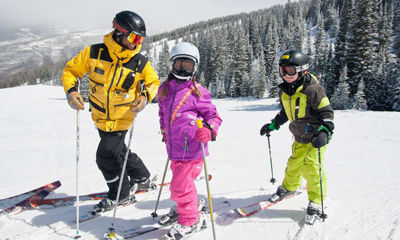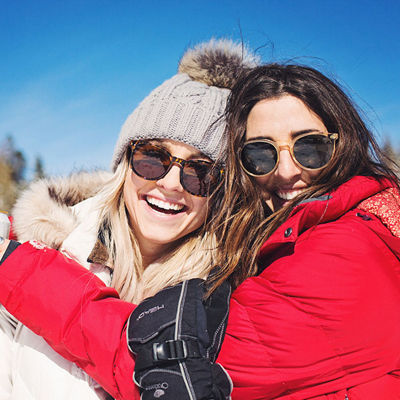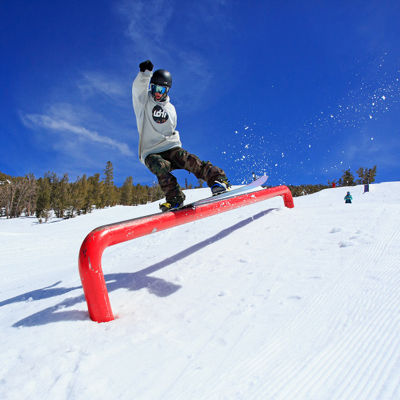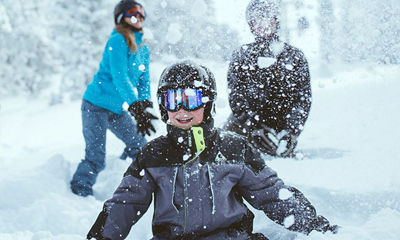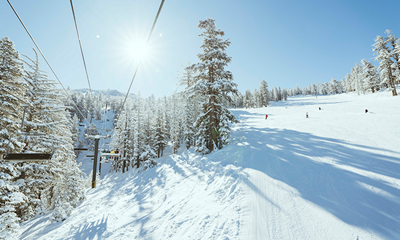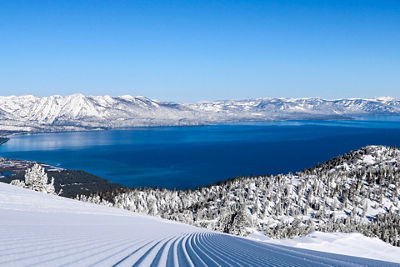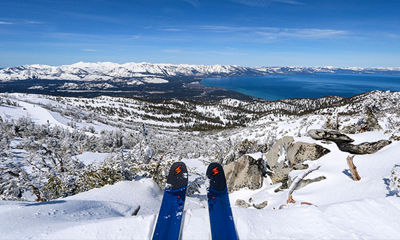
Altitude
Those with one or more of these symptoms may have Acute Mountain Sickness (AMS). If the symptoms do not subside quickly, call a doctor.
Here, snowboarding and skiing safety comes first for all of our guests and employees. That's why we’ve put programs into place to educate guests and promote the safety of everyone on the mountain.
Always show courtesy to others and be aware that there are elements of risk involved in skiing and snowboarding, knowing that common sense and personal awareness can help reduce risk.
Know your ability level and stay within it. Observe “Your Responsibility Code” and share with other skiers the responsibility for a great skiing experience.
Your safety is our top priority. Please read through the information below completely before you arrive to ensure your visit is a great and safe one!
Our Mountain Safety team is always out on the slopes, ready to help everyone stay safe and enjoy themselves. You can help the Mountain Safety team by skiing or riding in control, staying in-bounds, and by using common sense and courtesy while on the mountain.
The Mountain Safety Program includes:
• Educating, enforcing, monitoring, and providing positive reinforcement of "Your Responsibility Code".
• Monitoring slow zones and high traffic areas across the resort.
• Increasing guest and employee awareness of safety initiatives through on-mountain and community-wide activities through-out the season.
• Regular safety announcements in lift lines and other resorts locations.
Note: Any employee in uniform is available to assist with safety questions and is empowered to suspend or revoke the skiing or riding privileges of anyone demonstrating reckless or inappropriate behavior.
Vail Resorts takes the safety of our guests and employees very seriously. All skiers and riders are responsible for skiing and riding responsibly, complying with the Responsibility Code and avoiding collisions with other skiers and riders. The Resort may suspend or revoke skiing/riding privileges for reasons including but not limited to the actions listed below:
For ski/ride related infractions, the guest must complete the period of any suspension and attend a violator class presented by the Resort before skiing/riding privileges are reinstated. For non-ski/ride related infractions, the guest must complete the period of any suspension and meet with a member of Resort Management before skiing/riding privileges are reinstated.
The Resort may also ban violators from one or more resorts and other company properties, on a temporary or permanent basis. The Resort reserves all rights to pursue the recovery of any and all damages, including through legal action.
Heavenly is committed to promoting skier safety.
In addition to people using traditional alpine ski equipment, you may be joined on the slopes by snowboarders, telemark skiers, cross-country skiers, skiers with disabilities, skiers with specialized equipment and others. Always show courtesy to others and be aware that there are elements of risk involved in skiing and snowboarding, knowing that common sense and personal awareness can help reduce risk.
Know your ability level and stay within it. Observe the list below and share the responsibility with other skiers for a great skiing experience:
1. Always stay in control. You must be able to stop or avoid people or objects.
2. People ahead or downhill of you have the right-of-way. You must avoid them.
3. Stop only where you are visible from above and do not restrict traffic.
4. Look uphill and avoid others before starting downhill or entering a trail.
5. You must prevent runaway equipment.
6. Read and obey all signs, warnings, and hazard markings.
7. Keep off closed trails and out of closed areas.
8. You must know how and be able to load, ride and unload lifts safely. If you need assistance, ask the lift attendant.
9. Do not use lifts or terrain when impaired by alcohol or drugs.
10. If you are involved in a collision or incident, share your contact information with each other and a ski area employee.
Winter sports involve risk of serious injury or death. Your knowledge, decisions and actions contribute to your safety and that of others. If you need help understanding the Code, please ask any ski area employee.
SLOW ZONES
Certain areas (indicated on the map in yellow) are designated as SLOW ZONES. Please observe the posted slow areas by maintaining a speed no faster than the general flow of traffic. Space and speed are especially important in these areas. Fast and aggressive skiing will not be tolerated and could result in pass suspension
KNOW THE SIGNS
Please observe and respect our ski area and avalanche closure boundaries. Ducking ropes is considered disregarding and disobeying ski area closures.
WARNING: SKIING IN CLOSED AREAS WILL RESULT IN A 4 WEEK PASS SUSPENSION
At 9,000 feet, exposure to the sun is 40% greater than at sea level. We recommend sunscreen that is SPF 15 or higher, as well as eye protection.
Please do not litter. Pack it in, pack it out.
Your condition, speed, balance, body movements, alignment, trajectory and maneuver difficulty will directly affect your desired outcome.
Know the intended use of the freestyle terrain you have chosen. For example, some features are intended to be used in a series with no stopping, others have stopping areas. Jump takeoffs are for jumping and rail takeoffs are for entering onto rails (not jumping to the side).
Your actions can take you out of balance and cause serious injury or death, no matter how the feature is designed or where you land. Land on your feet.
Transitions are changes in the shape and pitch of the snow or feature, or changes from one type of sliding surface to another. Transitions can be gentle or abrupt, and demand that users be alert and respond to them with accurate movements.
Know where to land. The sweet spot is between the "knuckle" and center of the landing zone. Even if you land on or near the sweet spot, you can still be seriously injured or die if your landing posture is incorrect.
Inverted maneuvers are not recommended.
Be aware that features change constantly due to snow conditions, weather, usage, grooming and time of day.
Read and obey all posted signs, instructions and warnings before using freestyle terrain.
Some resorts designate features as small, medium and large. Be aware these ratings are determined by size, not degree of difficulty, and are relative only to that resort.
Heavenly encourages all guests to wear a helmet. While helmets may mitigate or reduce the severity of some head injuries, their use does not guarantee safety and will not prevent certain injuries.
Children's Ski School Helmet Policy
Heavenly recommends the use of helmets for children 14 and younger while participating in our children's ski school programs. Parents or guardians who decide their child (14 years and younger) will not wear a helmet, while in a ski school program, will be required to decline helmet use in writing, on the ski school release agreement prior to their child's participation.
Uphill access (non-lift access) at Heavenly is only permitted between 6 p.m. and 8 a.m., outside of lift operating hours. Users must call 530-542-6922 for approved routes, current conditions, and safety information before traveling uphill. All users must begin returning to the base no later than 15 minutes prior to the first lift opening.>
Non-lift access at Heavenly, such as uphill “skinning”, hiking, snowshoeing, may present high danger of personal injury to participants or others, and therefore may be limited or forbidden based on conditions, on-mountain activity and/or mountain policy.
Uphill access is not allowed while pre-season mountain preparations are in progress, during low snow conditions when the resort or portions of it are not open to the public; during avalanche mitigation work, and/or during other resort operational work impacting public areas.
Explore world famous terrain across two states. From the most scenic trail in skiing on Ridge Run to the steeps in Mott and Killebrew Canyon’s, Heavenly is the place to enjoy all of skiing’s finest moments with friends and family alike.
Paper trail maps will be available in-resort upon request.
